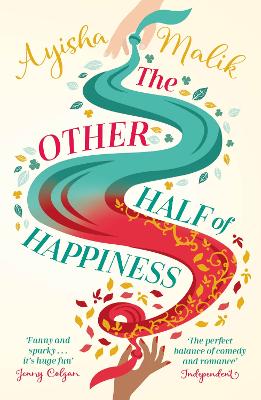Reviewed by Jo on
I absolutely adored Sofia Khan is Not Obliged by Ayisha Malik - so much so that I bought the sequel, The Other Half of Happiness before I was even half way through the first. I opened the second book looking forward to visiting these incredible characters again, and the humour that is a huge part of Sofia's personality. And although there is some humour, The Other Half of Happiness is a very different book. Where the first was a romcom, The Other Half is more of a drama. And it was absolutely incredible.
Where Sofia Khan is Not Obliged was lighthearted and humorous for the most part, The Other Half is a lot more emotional. I think it would be unfair to say, "Don't pick up this book expecting the first," because the characters are still the same people - there's Sofia's mum making hilarious but inappropriate comments, there are Sofia's friends being absolutely incredible, wonderful women, and there's Sofia being Sofia, who who I just love and so wish I could be friends with - but Sofia soon finds herself in completely different circumstances, and levity is hard to find.
I spent most of the book with a heavy heart. Not only is she finding it difficult to deal with the revelation of Conall's secret, but she's still grieving her father's death, plus feeling upset and kind of betrayed that her mother has decided to marry her childhood sweetheart, when her dad hasn't been dead a year yet. I got to a point where I was thinking, "What?!", gobsmacked and angry and upset on Sofia's behalf, wondering how Sofia was meant to get past this roadblock, but as the story continues, things just spirals more and more out of control. I was reading with a feeling of desperation, so emotionally involved in the story, and hoping so much that things would go a certain way, but then the story takes a turn that filled me with a differnt kind of desperation, one of fear and uncertainty.
The Other Half of Happiness had a surprising ending, and yet maybe it shouldn't have been surprising, because it was realistic. I have thoughts, but they will be spoil the story, so don't click the button if you have yet to read the novel and don't want it spoilt for you.
In the end, it doesn't come down to the fact that Sofia doesn't forgive Conall for lying and for leaving her to be with his son, Eamonn. It comes down to happiness. If Eamonn and his mother lived in London, there's not a doubt in my mind that she and Conall could have worked through things. But he didn't, he lived in Ireland, and Conall needed to right the wrongs of his past and be there for his son. And Sofia's choice came down to going with Conall to Ireland, or staying in London to be a part of something important, something that she loved and was passionate about. There was sacrifice to either choice. And sometimes, love just isn't enough. Because she does love Conall. And yes there's compromise, but when do you stop compromising and put your happiness first? I think she's learnt from her mother, how her marriage wasn't really a happy one, and now she's finally found a chance at real happiness. Sure, Sofia isn't choosing between two men, she's choosing between the man she's in love with, and a chance to actually make a real difference with co-founding a new publishing house, but when there's a chance at a fulfilled and happy life, even though it will be hard to be without Conall, and a life in Ireland where she will be unhappy... why should she sacrifice what will make her happiest in the long run? And there's no question that Conall should - must - go to Ireland and be with his son, Sofia isn't asking him to stay.
Yes, as a reader, I'm upset that things didn't turn out differently, that somehow Conall could be with his son, Sofia could start her new publishing house, and they could be together. Of course I wanted that happy ever after for them both. But this ending is more realistic. Things don't always work out in real life. Life isn't a fairy tale. And I'm actually happy that Sofia put herself first, her happiness first. I'm proud of her. Subtle feminism has run throughout both these two novels, but I feel it really plays its part here; love isn't necessarily everything, finding a partner isn't the only dream a woman has, and women should fight for and go for their dreams. I'm not sure that's necessarily the message of the book, but it's what I felt about Sofia's choice. A woman chose herself over a man. And I absolutely bloody love that.
The Other Half of Happiness isn't the book I was expecting. It was hugely emotional and heart-wrenching, but all the better for it. I may have adored Sofia Khan is Not Obliged, but I love The Other Half of Happiness more. It's real, it's raw, and it's beautiful. And I will absolutely read everything Malik writes in the future. I cannot recommend these two books enough.
Reading updates
- Started reading
- 25 June, 2017: Finished reading
- 25 June, 2017: Reviewed
